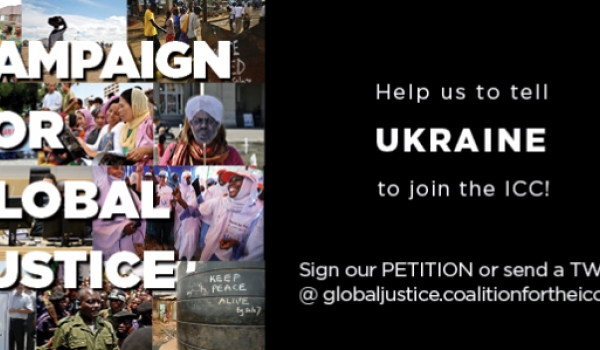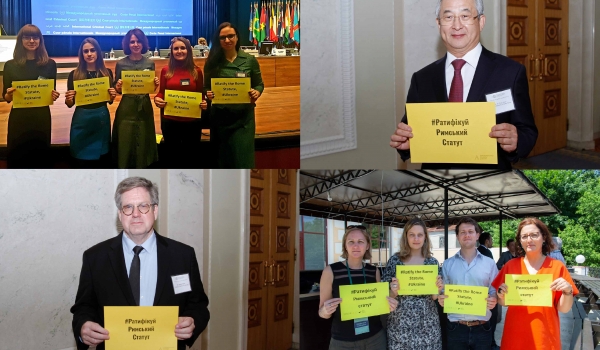
- Role of the International Community in Ratification of the ICC RS by Ukraine
- Letter to the President of Ukraine for ICC Rome Statute Ratification
- Press Release: Ukraine must join the ICC
- Ukrainian NGOs Statement at Ukraine Accountability Conference 14 July 2022
- NGO Workshop Conclusions and Recommendations - Margins Ukraine Accountability
In 2014, political tensions escalated to revolution, followed by the disputed Russian annexation of Crimea and armed conflict in Donbas between Ukrainian, separatist, and Russian forces. War crimes and crimes against humanity, including killings and enforced disappearances, have been alleged on all sides. The ICC prosecutor has opened a preliminary examination into alleged Rome Statute crimes to determine whether a full investigation is warranted.
Ukraine was the first non-ICC member state to accede to the Agreement on Privileges and Immunities of the ICC in 2007.
The ICC prosecutor opened a preliminary examination of the situation in Ukraine in April 2014 after non-member state Ukraine accepted limited jurisdiction through a declaration under article 12(3) of the Rome Statute. The declaration covered crimes committed on Ukrainian territory or by its nationals from 21 November 2013 to 22 February 2014. In September 2015, following a second 12(3) declaration, Ukraine expanded the jurisdiction to also cover crimes from 20 February 2014 onwards.
Regarding the period from November 2013 to February 2014, due to the absence of an ‘armed conflict’ in Ukraine at the time, the OTP has mainly considered possible crimes against humanity by the Ukrainian authority against protesters, despite noting that information does not suggest the attacks were widespread or systematic. Later events, including conflicts in Crimea and Donbas, may involve war crimes as well, and the OTP will also consider findings on the July 2014 downing of Malaysia Airlines MH17, as well as future alleged crimes in the Ukrainian situation. The issue of granting amnesty to participants in the conflict in eastern Ukraine, as envisioned by the 2015 Minsk Agreement on regulating the conflict in the Donbas region, has proven to be contentious.
The Office of the prosecutor has considered the following possible legal qualifications under the Statute in this situation: enforced disappearances and killing, torture and other forms of ill-treatment, forced conscription of Crimean residents to serve in the armed forces of the Russian Federation, deprivation of defendants’ rights of fair and regular trial, deprivation of liberty, transfer of part of the civilian population of the Russian Federation into Crimea and of part of the population of Crimea outside the territory, seizure of property, alleged persecutory acts, conduct of hostilities, treacherous killing, murder, sexual and gender-based crimes, use of child soldiers, and torture and ill-treatment in detention.
Ukraine’s article 12(3) declarations accepting ICC jurisdiction make the country subject to Rome Statute cooperation obligations.
Ukraine became the first non-ICC member state to ratify the Agreement on Privileges and Immunities of the ICC in 2007, which facilitates cooperation with the Court.
Ukrainian representatives have stated their support for the Court during Ukraine’s UN Security Council membership, several times reiterating their commitment to joining the ICC.
Ukraine was also the only state not party to the Rome Statute that co-sponsored and supported the May 2016 adoption of the annual UN General Assembly resolution affirming UNGA cooperation with the ICC.
The Coalition’s numerous international and local Ukrainian members have long-advocated justice for victims of alleged international crimes committed in Ukraine, whether by Ukrainian, separatist, or Russian forces. The Coalition has welcomed Ukraine’s contribution to addressing impunity through the international justice system, by way of its ad hoc acceptance of ICC jurisdiction.
Civil society work includes, among other activities, attending hearings and meetings with Parliamentarians and conducting practitioner seminars and public outreach. Civil society organizations have also documented violations of human rights and international humanitarian and criminal law committed during and after the Euromaidan protests and in the context of the armed conflicts in Crimea and Donbas.
Need for Rome Statute ratification
Ukraine signed the Rome Statute on 20 January 2000, but due to a 2001 constitutional court ruling declaring the treaty incompatible with Ukraine’s constitution, the government has not ratified the Statute. Civil society has been calling on Ukraine to formally join the ICC for many years.
The constitutional provisions cited as reasons for non-ratification of the Rome Statute concern the principle of complementarity, the irrelevance of official capacity, the transfer of Ukrainian citizens to the ICC, and the enforcement of sentences in third States.
A constitutional amendment that would enable ratification passed with a worrying new clause in 2016, delaying the amendment’s entry into force for three years. Ratification of the Rome Statute is one of Ukraine's international obligations under the 2014 EU-Ukraine Association Agreement.
In April 2017, human rights organizations from Ukraine and Belgium produced recommendations to Ukrainian authorities and the EU, including visions on an EU course of action to protect human rights in the context of the occupation of Crimea and launched by Russia hybrid war in Donbas.







